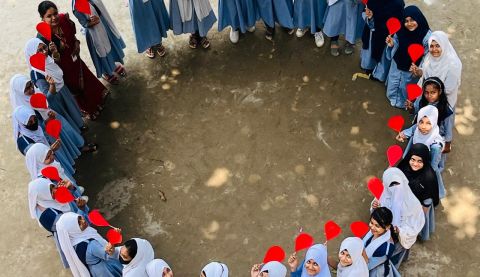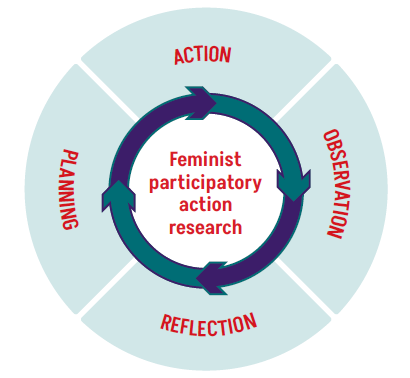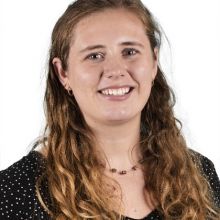Girl led action: what girls are doing to challenge structural injustice
29 November 2024
Adolescent girls worldwide face unique and significant power imbalances that profoundly impact their daily lives. These are distinct from the challenges faced by girls (young children) or adult women. Structural inequalities, rooted in colonial legacies, hinder their access to education, support services, and basic rights during this critical transitional period between childhood and adulthood.

What are ActionAid and partners doing about this issue?
To identify the issues which are truly restricting adolescent girls’ lives, ActionAid launched the Girl Led Research and Girl Led Action phased approach. The research phase is shaped by a collaborative, participatory action research methodology which employs an intersectional feminist and decolonial approach, recognising adolescent girls as powerful agents of change. It addresses the crucial gap in research to do with the experiences of adolescent girls, by centring them as the leaders in this piece of work as the lead researchers in this study: from identifying relevant questions to collecting and analysing data and developing recommendations – the adolescent girls did it all.

The girl-led action phase supports advocacy and action work enabling the girls to enact change based on the findings of their research. From local government offices to art competitions, the girls identify what their spheres of influence are, and then use different advocacy tools to try and generate change that will truly and positively impact their lives.
What has happened?
The research phase led to this incredible piece of work: Girl-led research: how we build power together, which pulls together the research findings of adolescent girls from Bangladesh, Ethiopia and Indonesia. Bangladesh and Ethiopia decided to go forward with the action phase, focusing on menstrual health management, mental health, and sexual and reproductive health in Bangladesh, and gender-based violence in Ethiopia.
As a result of the action phase, the girls in Bangladesh have had a wide range of wins, including successfully:
-
Setting up a safe space in an adolescent girls’ club, which provides mental health support to the adolescent girls who may need it
-
Training up youth advocates in advocacy, negotiation, critical thinking, writing, speaking, and gender awareness, enabling them to promote Sexual Reproductive Health Rights and menstrual health management effectively
-
Launching 4 Sexual Reproductive Health Rights ‘corners’ in local education institutes
-
Creating a dedicated space in the local government office for advocating for women’s issues and improving understanding among religious leaders through sensitization workshops that have garnered wider community support for women’s issues
Likewise, in Ethiopia, there was a range of impressive wins from the adolescent girls leading advocacy and action around the gender-based violence they face, and the lack of awareness they identified across their communities on how this impacts their lives. Some of their wins include:
-
Producing a TV animation as well as a radio audio production on raising awareness on how gender-based violence affects the girls’ lives, with a call to action for everyone to advocate for girls’ rights to not face violence. These were broadcast across seven different national and regional media agencies
-
Training youth advocates with relevant advocacy tools, as well as training ActionAid Ethiopia staff on how to conduct trainings (training of trainers) on supporting adolescent girls to become youth advocates to reach more girls, beyond this specific project
-
Youth advocates produced leaflets on the laws and criminal codes around gender-based violence in Ethiopia to raise awareness on the rights that girls have.
None of the above would have been possible without ActionAid Bangladesh, ActionAid Ethiopia, and ActionAid Yapikka (Indonesia). This work was funded by the generous funds raised by the players of People’s Postcode Lottery.
What will happen next?
Based on the success of the first iteration of research and action phases, ActionAid was able to secure further funding for a second chapter to this approach. Girls in two locations in Nigeria, as well as in Sierra Leone, finished their research earlier this year. The adolescent girls conducted local launches of their research findings in the summer, and the joint report, titled ‘Shifting the power: advancing girl-led research’ will be launched in early 2025.
Currently, the adolescent girls are implementing their own action phases. In Nigeria, one of the key findings from the research was the exclusion girls face from the digital world: The girls found that better and informed access to technology could close the education gap, as well as increase socioeconomic opportunities. As a result, they are currently working on strengthening the use of technology amongst adolescent girls. Other key findings from girls in Nigeria were that adolescent girls consistently lacked power to make choices or decisions about their own lives, as well as being undermined by community members, and undergoing unequal treatment compared to boys. To address this through the action phase, the adolescent girls are focusing on disseminating the findings of the research, and securing commitments for change with key power holders.
In Sierra Leone, the girls chose to focus part of the action phase on building their skillset to become stronger youth advocates. With these skills, they want to raise awareness about the findings of the research, specifically on the impact of financial hardships on their wellbeing and education, the educational disparities between boys and girls, drug abuse, child marriage and adolescent pregnancy, and gender roles. For example, as their research found that eliminating drug use is key for them to pursue the futures they want, the adolescent girls are planning on engaging with religious leaders, as well as using radio discussions and youth conferences to discuss the harmful effects of drug use.
None of this would have been possible without the leadership of ActionAid Nigeria and ActionAid Sierra Leone, and their partners Baba Azimi Foundation, and Teenage Network in Nigeria. Crucially, this work was funded by tcc Foundation.
